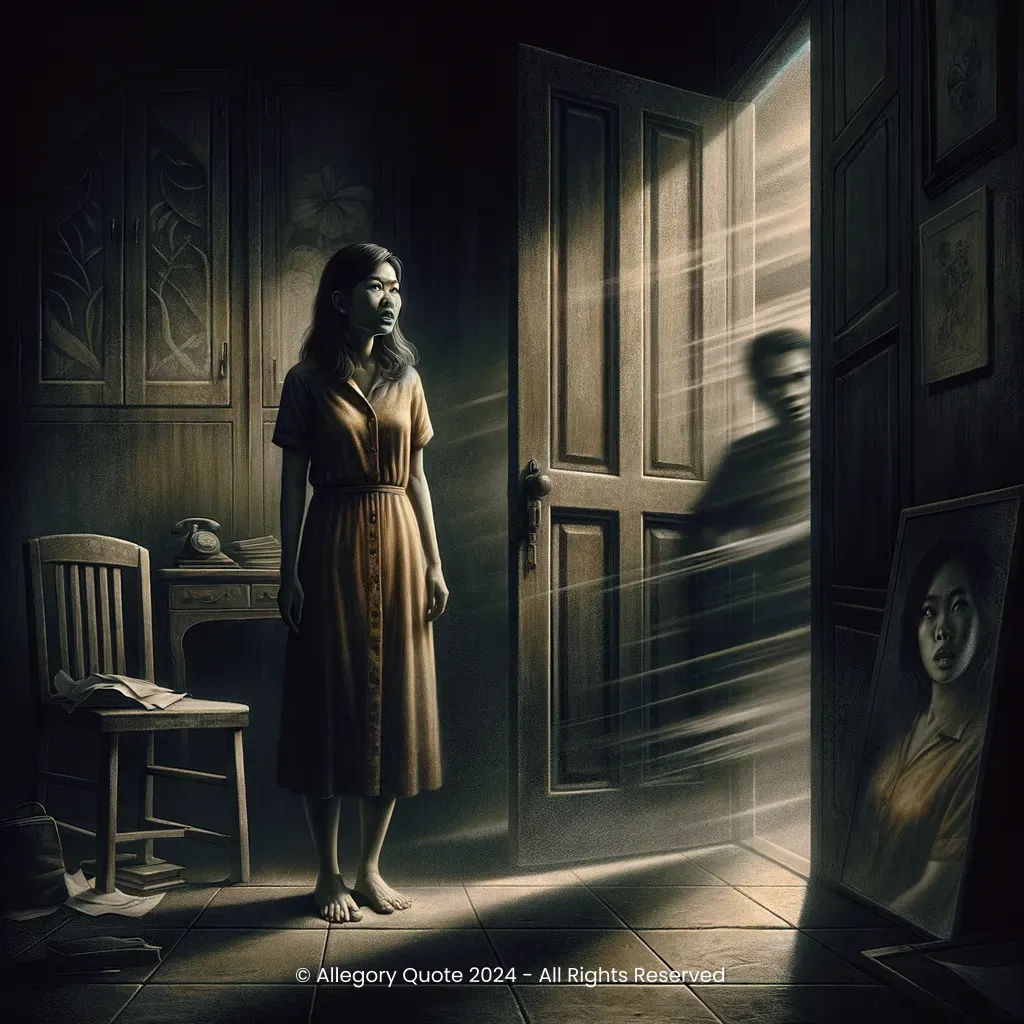Suspicion always haunts the guilty mind

0
0
0
0
- Meaning
- The phrase "Suspicion always haunts the guilty mind" implies that those who have committed wrongdoings are often plagued by a feeling of suspicion and paranoia. Guilt itself makes one suspicious of others and even the world around them. This psychological torment is a form of self-punishment, suggesting that one's conscience is never entirely at ease after committing a misdeed.
- Allegory
- The image elements include a dimly lit room representing the mind's dark corners where guilt hides. The anxious person symbolizes the individual wrestling with their inner fears, and the heavy, ajar door represents the constant presence of looming threats and suspicions. The overturned chair, scattered papers, and broken mirror evoke symbols of chaos and the shattered self-perception that guilt brings. The abstract shapes outside the door signify the external manifestations of suspicion, always looming and ready to invade the mind. These elements together articulate the phrase's exploration of guilt and its psychological consequences.
- Applicability
- In daily life, this phrase can remind us about the psychological burden of guilt. It teaches the value of living an honest and moral life to avoid the mental distress associated with wrongdoing. At work, it can imply that integrity leads to peace of mind, while deceit can result in ongoing anxiety and mistrust.
- Impact
- This phrase has had a profound impact on literature and popular culture. It is frequently cited to illustrate the psychological effects of guilt and has influenced various literary works, films, and discussions on moral philosophy. It emphasizes the universal theme of how inner guilt can manifest as external paranoia.
- Historical Context
- "Henry VI, Part 3" was first performed in the late 16th century, around 1592-1593. The Elizabethan period was marked by political intrigue and power struggles, which Shakespeare often reflected in his historical plays, highlighting the turbulence of human emotions amidst conflicts and moral failings.
- Criticisms
- There are criticisms that the phrase assumes guilt always leads to suspicion, which may not account for variations in individual psychological responses. Some people might suppress guilt or outwardly dismiss it, rather than be haunted by suspicion. Additionally, not all guilty individuals exhibit paranoia, as some may have different coping mechanisms.
- Variations
- Variations of the phrase may exist in different cultures, suggesting a universal human understanding of guilt and suspicion. Many cultures have proverbs or sayings that emphasize the internal torment caused by guilt. For instance, the Chinese proverb "做贼心虚" (zuò zéi xīn xū) translates to "A thief has a guilty conscience," embodying a similar idea.
-

The golden age is before us, not behind us.
-

No legacy is so rich as honesty.
-

Some rise by sin, and some by virtue fall.
-

know what were good to do, chapels had been churches, and poor men's cottages princes' palaces.
-

What is past is prologue.
-

If to do were as easy as to know what were good to do, chapels had been churches, and poor men's cottages princes' palaces.
-

A horse! a horse! my kingdom for a horse!
-

There's daggers in men's smiles.
-

Power tends to corrupt, and absolute power corrupts absolutely.
-

Things without all remedy should be without regard: what's done is done.
No Comments